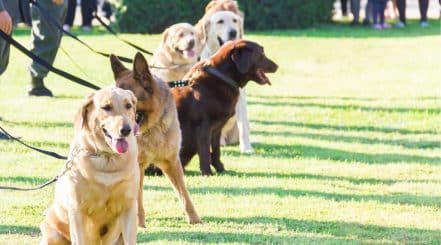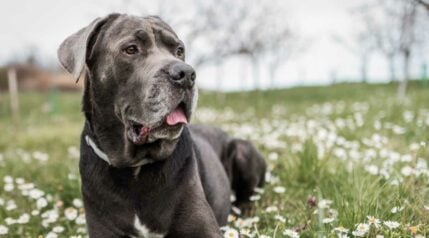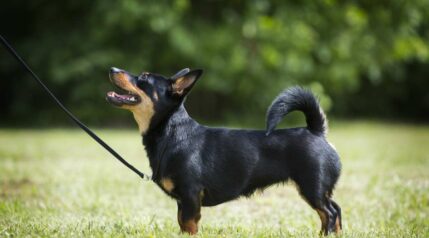Declaring which dog breeds are best for children with autism is nearly as challenging as defining how autism looks and acts. Each child is a unique individual with strengths and challenges, and the goal, as with any pet acquisition, is to find the right pet for the right situation. Having a child with special needs can make this task more challenging. Because autism presents in many ways and isn’t just one set of symptoms or behaviors, we have to consider the situation that will benefit from adding a dog and what role that dog must fulfill.
According to Autism Speaks: “Each person with autism has a distinct set of strengths and challenges. How people with autism learn, think, and problem-solve can range from highly skilled to severely challenged. Some people with ASD may require significant support in their daily lives, while others may need less support and, in some cases, live entirely independently.”
Because autism is not a one size fits all category, which breeds are best suited for children with autism depends on the specific child’s needs. One child might benefit from a specially trained service dog. For another, a therapy dog might be the right choice. The right companion dog for an autistic child might even be the family dog with the right blend of characteristics, one suited for children with behaviors associated with autism. The first thing to consider is what the child and the family need, and then find the right calm, affectionate and tolerant canine companion to meet it.
Companion Dogs
Most people who have dogs as pets simply enjoy their company. We find their presence soothing. Most children enjoy the company of a pet. They have greater self-esteem and empathy for others when they grow up with a dog. A study on cardiovascular reactivity to stress showed that owning a dog positively affects how we handle stress. Even in couples, reactivity to stress was lowest, and recovery fastest in couples tested when their pet was present. This calming presence can be beneficial for autistic children.
Getting any dog is a commitment for the entire family. When all family members work together to care for a new pet, the autistic child benefits from working towards a common goal with their siblings and having a common interest with other neurotypical children at school and in the neighborhood. Caring for their dog teaches children responsibility and practical skills that translate to real life.
Service Dogs
Each service dog is trained specifically to accommodate the needs of the person it will assist. Service dogs help people with visual or hearing impairment, mobility issues, diabetes, epilepsy, or developmental disorders such as autism. Service dogs differ from companion dogs by being extensively trained and officially certified. The Americans with Disabilities Act ensures people the right to bring their service dogs to all public areas, even restaurants. Service dogs usually wear a special harness to identify their purpose.
Autistic children and their families often find visits to public places triggering. If a child’s anxiety escalates during visits to the doctor or dentist, autism service dogs recognize and de-escalate an emotional meltdown. They can interrupt self-harming behaviors by gently lying across the child’s lap and applying gentle pressure to calm the child. Never rely on a service dog to prevent an autistic child from wandering completely, but a service dog trained to recognize the child’s scent can expedite the search if a child wanders, and time is of the essence.
Therapy Dogs
Therapy dogs are trained to assist with physical therapy or calm patients under stress. We see them visiting nursing homes and schools to enrich the well-being of the people they visit or to help them work through stressful events. They’ve found a place in the autism community because they help quiet autistic children while promoting social interaction. Most autism therapy dogs have special training but do not have the same credentials as certified service dogs and lack the same level of access to public places. When choosing a therapy dog, we recommend using an accredited agency such as one of those listed on the Assistance Dogs International website.
Best Breeds For Autistic Children
No matter which category of dog you seek for your family, be it a companion dog, service dog, or therapy dog, start with a calm, loving, and tolerant breed. Seek advice from your child’s doctor or a local assistance dog agency to help you navigate the process. If you need a service dog, expect it to take up to two years to find the perfect match.
While rescue dogs often make great family pets, autistic children may make sudden movements or inadvertently be rough with their dog. Many rescue dogs have histories that could prompt them to react with unexpected aggression if they feel threatened. Such a situation will end badly for both child and dog.
Labrador Retriever
One of the most common breeds used as service dogs is the Labrador Retriever. Bred to retrieve, the Labrador’s cheerful and eager disposition helps him bond with his young charge, and his biddability makes him easily trained. Labrador Retrievers are the preferred breed in many cases because their characteristics make a successful match likely. NEADS has very tight criteria and uses only people-oriented, well-mannered Labrador Retrievers between 50 and 75 pounds. These happy canines make great companion dogs for families with an autistic child or when trained as service or therapy dogs.
Golden Retriever
The Golden Retriever excels as both a service and therapy dog. His friendly disposition and desire to please make him the life of the party and the happiest one in the room. The Golden’s unwavering optimism and high trainability make him a top choice as a service dog. These traits also make them excellent family companions for families with autistic children. Quieter than other breeds, they calmly accept sudden movements that might make other dogs snap. This is important with autistic children who might accidentally trigger a less accepting breed. Goldens need basic obedience training, and they’ll need to be specifically trained not to jump against the child.
German Shepherd
German Shepherds go to great lengths to please their owners. Their intelligence and task-oriented temperament make them popular as service dogs for children with autism. Their size allows GSDs to protect their charges from harm by physically blocking the child from running off. They are large enough to intervene if their person has an anxiety attack or emotional meltdown, which can happen even in adulthood for people on the autism spectrum. The GSD service dog can lie gently on the child’s body or put its paws on the child’s lap to calm him down. They are sensitive to their child’s impulses and can distract them from overstimulation or self-harm.
Poodle
Well known as one of the most intelligent and trainable breeds, Poodles are available in more than one size, which means there’s a size for every household, no matter how modest. Standard Poodles can use their size to influence their person physically, but the Toy and Miniature Poodles are a better fit for indoor lifestyles and smaller floor plans. All three possess the intelligence and trainability that make Poodles popular as service dogs. They are “friendly, patient, gentle, and at ease in most situations,” traits beneficial when working with autistic children.
Boxer
Boxers are generally included on lists of service dog breeds for their friendly and generous personalities. They are optimistic dogs with a patient and protective nature. Boxers’ intelligence lends to their trainability, and they are excellent problem solvers. Boxers are one of the best breeds for children in general, but you must consider the individual dog and child’s personality. Boxers’ typical high energy may be overstimulating for some autistic children.
Great Dane
These giant dogs may not fit in every family’s home, but they are a great fit as certified service dogs. Great Danes rank very well in adaptive training. This means they must be able to adapt to any situation in which they find themselves, assess the situation, and find a way to help their person. Great Danes’ size and strength help them physically support children with mobility problems. Loyal to their families, they’re also friendly with strangers. They tend to attract attention and facilitate social interaction for the child.
Pembroke Welsh Corgi
Corgis are herding dogs, and their herding instinct makes them attentive to their small charges who may wish to wander. It’s unfair and unsafe to task a service dog to keep an autistic child from wandering, but the Corgi act as a natural obstacle to flight. They are friendly and upbeat, and quick movements don’t fluster them. Even though they’re often seen on farms and in stables, Corgis adapt well to apartment life as long as they exercise daily.
Cavalier King Charles Spaniel
The Cavalier King Charles Spaniel was originally bred as a companion dog. Cavaliers will stick by their child’s side, and their small size makes them a handy dog for an apartment or small home. Unlike many small breeds, they tolerate unexpected movements, an important consideration when working with an autistic child. They are a manageable size for a child to handle and snuggle and an easy fit on a lap to provide comforting weight.
Newfoundland
Newfoundlands love children, and children love teddy bears. Hugging a Newfoundland is like hugging a giant teddy bear who loves you back. Sometimes called “nanny dogs,” their sweet and accepting temperament is their defining characteristic. Their immense size can be both a benefit and a drawback when choosing a pup for an autistic child. This gentle giant is infinitely cuddleable but may be too large for many homes and yards. They don’t need a lot of exercise for their size, and thirty minutes per day may be enough. They shed more than many other breeds and have a shorter lifespan than most smaller service dogs.
Bernese Mountain Dog
The Bernese Mountain Dog, another gentle giant, is excellent with children. Berners make great overall family dogs, although they typically bond most with one family member. If your child responds best to dogs with size, a Berner makes a very huggable friend. Even with their size, they are friendly with strangers and are relatively easy to train. Calm and dependable, they are indoor dogs but need at least thirty minutes of exercise daily to stay healthy. They shed more than most other dogs, so consider hair in the house before deciding on a Berner. Unfortunately, they have a shorter lifespan than smaller dogs.
Beagle
For some children with autism, the friendly Beagle may be the perfect pup. Beagles get along well with children and never meet a stranger. Beagles thrive on affection. Happy-go-lucky and active, these smaller dogs enjoy being outdoors. Beagles may not be the best choice for a child sensitive to noise, as they tend to bark excessively. However, they can keep up with the most active child with their abundant energy.
Collie
There’s a reason the famous canine character, Lassie, was a Collie. Loyal family companions are intelligent and learn quickly. Collies are particularly attuned to human emotion, which makes them a well-suited partner for a child on the spectrum. Collies are gentle but playful. They tend to stick close to their owners and close to home.
Final Thoughts
Autism is a broad diagnosis, and there’s no one-size-fits-all when pairing a dog with a child, even without this additional layer. If you believe your family could benefit from the love and joy a dog can bring, discuss your options with your pediatrician and see what local resources are available to help. The Autism Speaks website can guide you as you begin your journey to find the right canine companion for your unique situation. Don’t give up if you don’t find the perfect match right away. Good things take time, and seeing your child’s connection with the right pup will be worth all the legwork you’ve put in.





